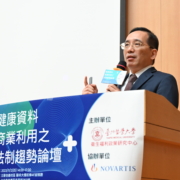【Post-Event Report】Forum on Legal Trends in the Commercial Use of Health Data (Second Half)
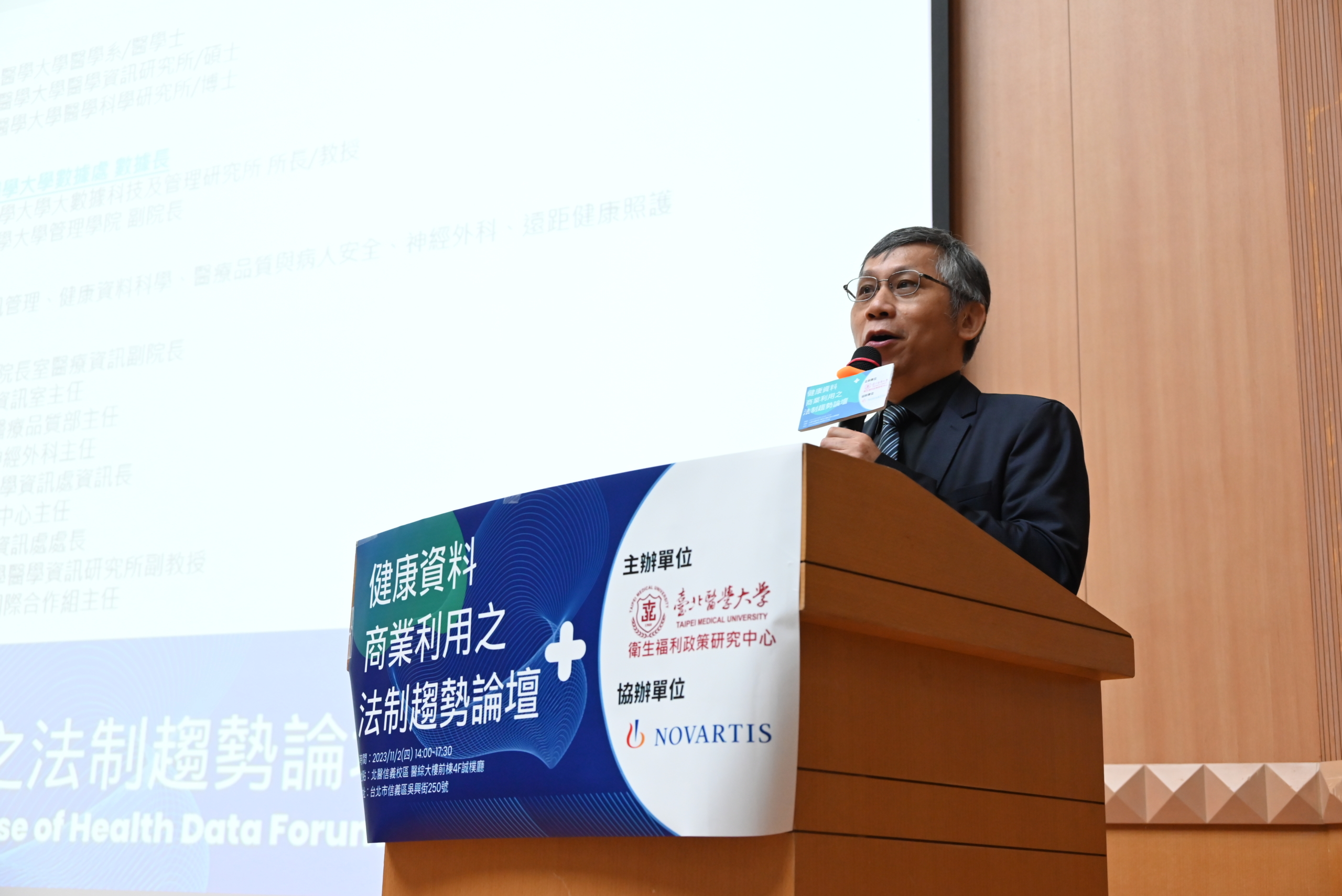
Vice Dean Hsu Ming-Hui, Taipei Medical University School of Management
Vice Dean Hsu expressed his position on the management of commercial health data utilization, emphasizing his opposition to including commercial health data utilization in Institutional Review Board (IRB) regulations. He also expressed his gratitude for Vice Director Li Chung-Hsi’s and Dean Chen’s perspectives on public welfare. Vice Dean Hsu emphasized the need for substantial databases in biomedical research and encouraged everyone to pay more attention to the value of “Health.”
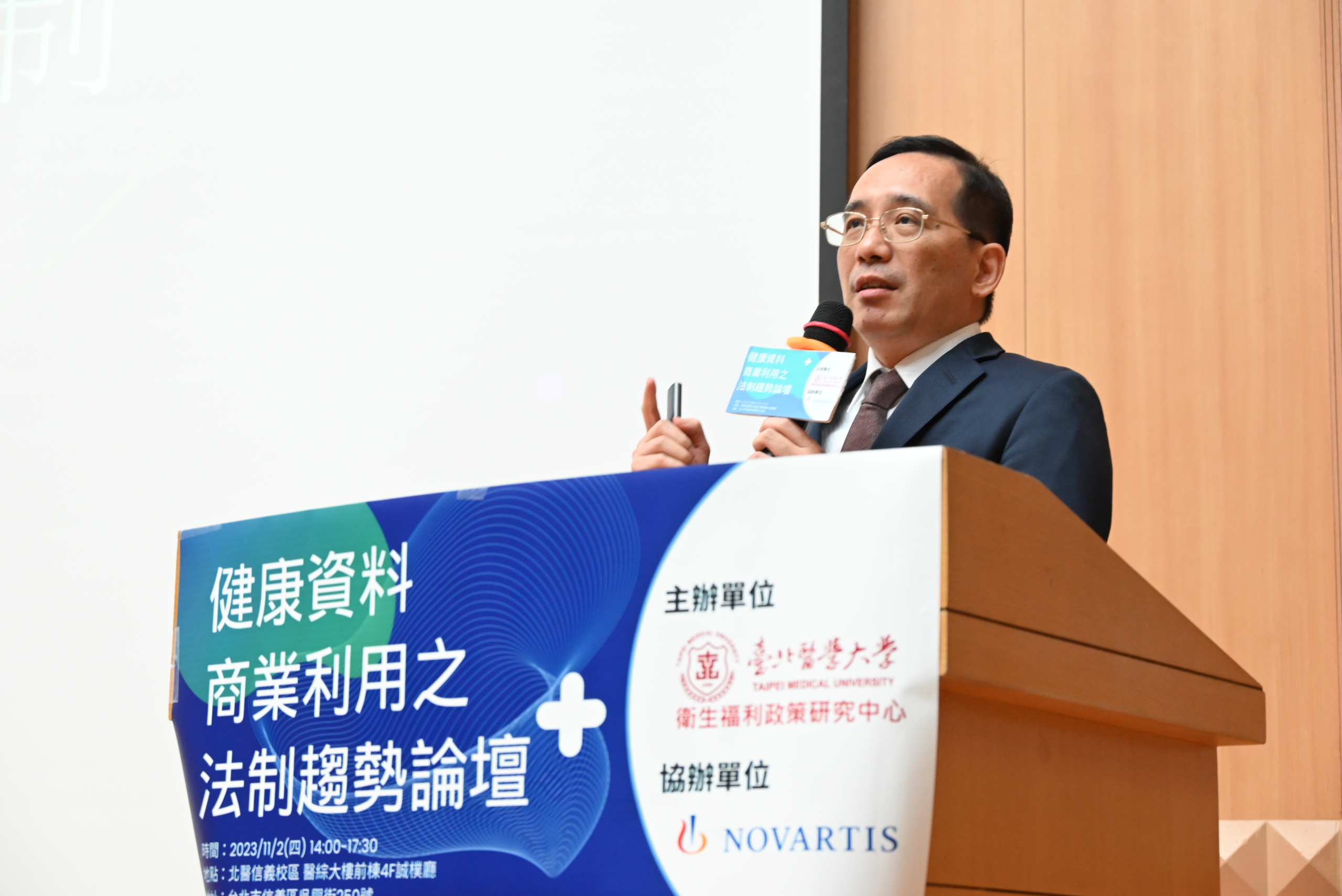
Deputy Director Lee Chung-Hsi, Health and Welfare Policy Research Center
Deputy Director Lee, guided by the perspective of health human rights, emphasized the importance of establishing a legal framework for health data utilization in Taiwan, highlighting its critical role in upholding human rights and promoting public health.
Deputy Director Lee first mentioned the declaration by the World Health Organization (WHO), which recognizes health as a fundamental human right, demanding that countries ensure that people have access to timely, acceptable, and affordable healthcare. This also includes requiring countries to take measures to rectify any discriminatory laws, practices, or policies to achieve health equality and non-discrimination.
He further elucidated the concept of health human rights, stating that the core of health human rights is equality, not freedom, and that the National Health Insurance (NHI) system is the cornerstone of realizing health human rights. He emphasized that the sustainable and efficient operation of the NHI is a national responsibility, and the utilization of health data is crucial for the system’s sustainable development.
Deputy Director Lee provided data to support his argument, noting that Taiwan’s healthcare expenditure as a percentage of the Gross Domestic Product (GDP) is relatively low, indicating room for growth in healthcare spending. Especially since 2017, Taiwan’s health insurance efficiency for new drugs has been declining. Compared to other countries, only about 41% of new drugs in Taiwan receive health insurance coverage, a figure significantly lower than countries where nearly all new drugs are covered.
Deputy Director Lee emphasized that increasing investments in national healthcare not only promotes public health but also contributes to the workforce, generates fiscal revenue, and drives long-term economic development for the country. On the other hand, investments in health are also a practice of health equality and social solidarity, which relies on robust empirical research as a foundation. Therefore, the legal framework, particularly concerning data, is crucial.
Deputy Director Lee advocated for the establishment of a legal framework for health data utilization, including proposing mechanisms for prospective and retrospective data research. He recommended amending laws to allow for more health data research usage while establishing corresponding safeguards to balance individual autonomy and social solidarity, two vital social values. He underscored the importance of the perspective of health human rights in establishing a legal framework for health data utilization, providing empirical data and policy recommendations to further the development of Taiwan in this field. This, in turn, aids in enhancing the efficiency of Taiwan’s healthcare system, promoting health equality, and ensuring full protection of human rights.
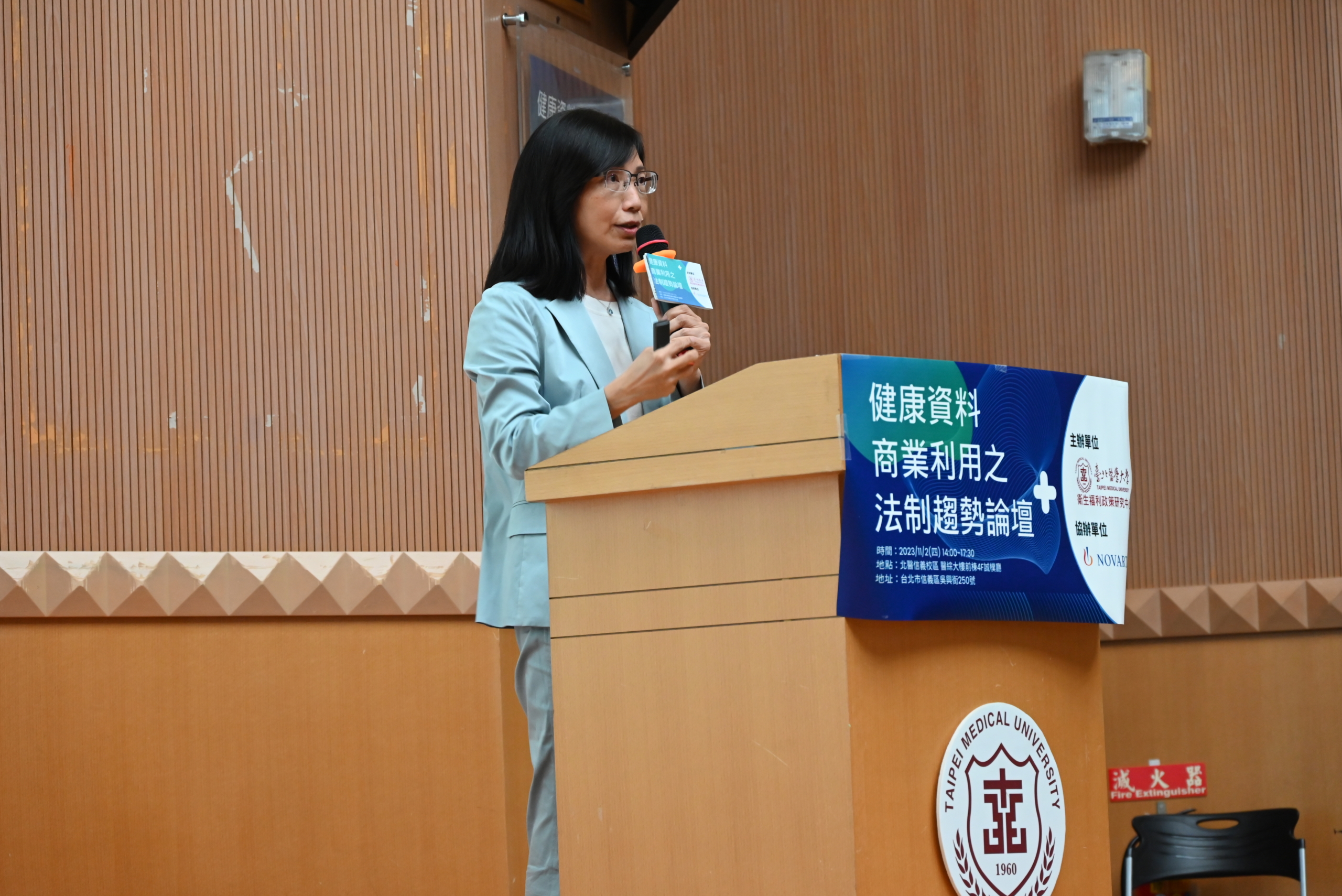
Hui-Chin Tseng, Honorary Vice President, PwC Taiwan
Vice President Tseng pointed out that the fusion of technology and healthcare is revolutionizing Taiwan, transforming our lives. While not a legal expert, she discussed this topic from a business perspective.
Science fiction stories have always fueled our boundless imagination of the future. In reality, many technologies depicted in science fiction works have become real. For example, the concept of micro-robots capable of autonomously detecting human disease symptoms, as seen in the 1966 movie “Fantastic Voyage.” By the end of 2021, Medtronic introduced “PillCam at HOME,” a remote home-based capsule endoscopy technology that aids gastroenterologists in diagnosis without the need for hospitalization or anesthesia.
Medical devices that diagnose conditions without the need for blood draws, physical contact, or scans have also become a reality, inspired by “Star Trek” from 1969. Israel’s ContinUse Biometrics developed sensor technology capable of remotely monitoring physiological data like heart rate, blood pressure, and respiration from several meters away and plans to expand to 20 different metrics. Taiwan has also made significant strides in this area:
- FaceHeart Inc.: This company utilizes AI image recognition for non-contact physiological signal measurement and has received FDA approval in the United States.
- GeniScan Medical Electronics: They developed a magnetically controlled capsule endoscope for examinations of the upper digestive tract.
These innovative technologies, FDA-approved, have turned science fiction into science fact, altering the lives of people in Taiwan. AI is making notable advancements in areas like image processing, big data analysis, and disease detection, and Taiwan is emerging as a participant in global health technology.
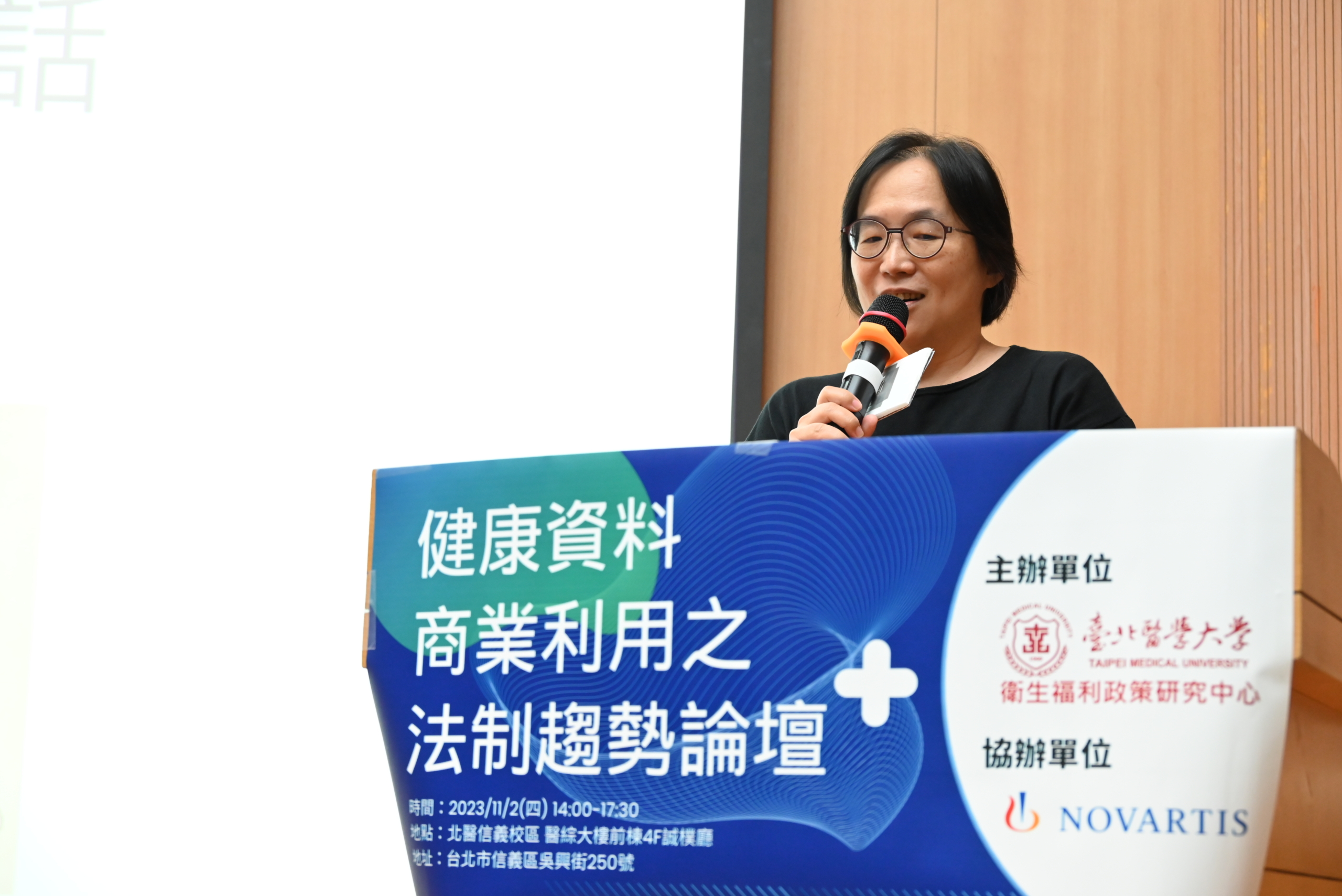
Yi-Hsiu Hou, Secretary-General, Taiwan AI School Foundation
Secretary-General Hou discussed the importance of artificial intelligence (AI) training and the rapid development of AI technology.
Secretary-General Yi-Hsiu Hou emphasized the critical role of AI training in response to the rise of AI technology. She mentioned that the Taiwan AI School has already trained over 10,000 students, with approximately 15% of them being medical doctors. She further stressed that having a fundamental understanding of AI is essential because AI applications require corresponding infrastructure, including software and hardware design.
Secretary-General Hou Yi-Hsiu further noted that the emergence of generative AI technology has brought new challenges to training. Generative AI can continuously generate new data and train models, making the learning demands of AI more urgent. She pointed out that since the beginning of last year, the school has observed a sharp increase in the demand for AI learning, attracting students from various industries with different backgrounds and professions.
Secretary-General Hou Yi-Hsiu stated that the Taiwan AI School Foundation is committed to meeting the growing demand for AI learning by providing students with the latest training and resources to address the rapid development of AI technology. The Taiwan AI School Foundation also announced a series of new AI training programs to address the evolving AI landscape.
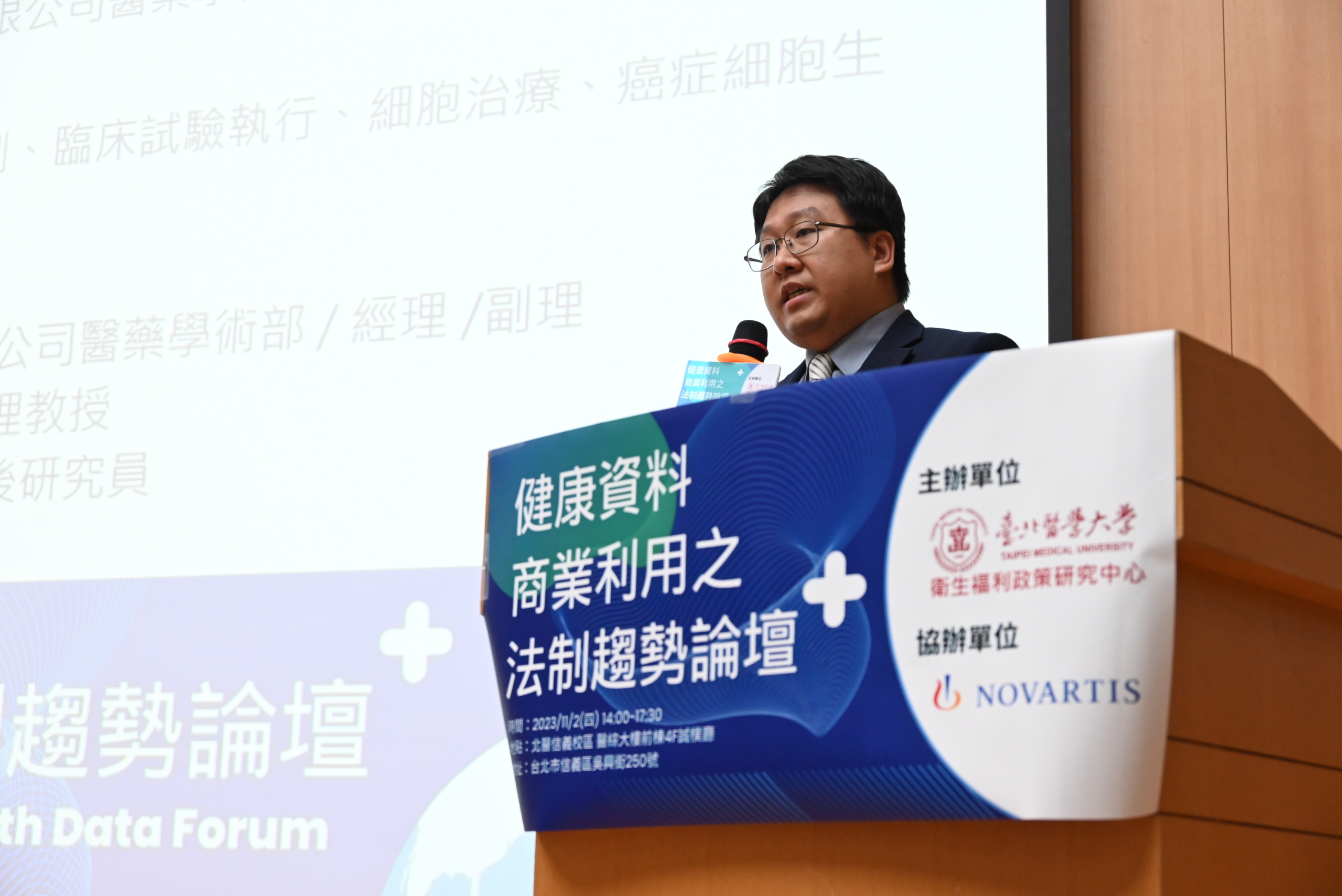
Yi-Min Lee, Director, Academic Affairs Department, Novartis Taiwan
Director Lee delved into the challenges of utilizing real-world data in the pharmaceutical field. He emphasized the critical importance of “feasibility” in drug development. However, traditional methods often consume significant time and human resources in selecting medical institutions and estimating the number of patients. These estimations are frequently less accurate.
Director Lee proposed the establishment of a hospital data interoperability platform that, through information sharing, would provide more precise assessments while saving time and manpower. Such a platform could efficiently link health data and offer crucial support to pharmaceutical companies. He envisions the integration of health data in the future to more effectively address the needs of drug development.
Furthermore, he noted that drug development typically focuses on unmet medical needs. For instance, Taiwan’s cancer registry could provide valuable resources to help determine the feasibility and potential benefits of drug development.
For multinational pharmaceutical companies like Novartis, Director Lee mentioned that they often use platforms such as private insurance databases. However, Taiwan’s data is often not included in these platforms, necessitating the conduct of Asian trials or reliance on the National Health Insurance database. Nevertheless, using these data still requires collaboration with academic institutions, adding time costs. From a regulatory perspective, more costs are involved in compliance with Taiwanese regulations, including the validation of foreign clinical trial data’s applicability in Taiwan. All these factors may make Taiwan a less prioritized region for multinational pharmaceutical companies.

